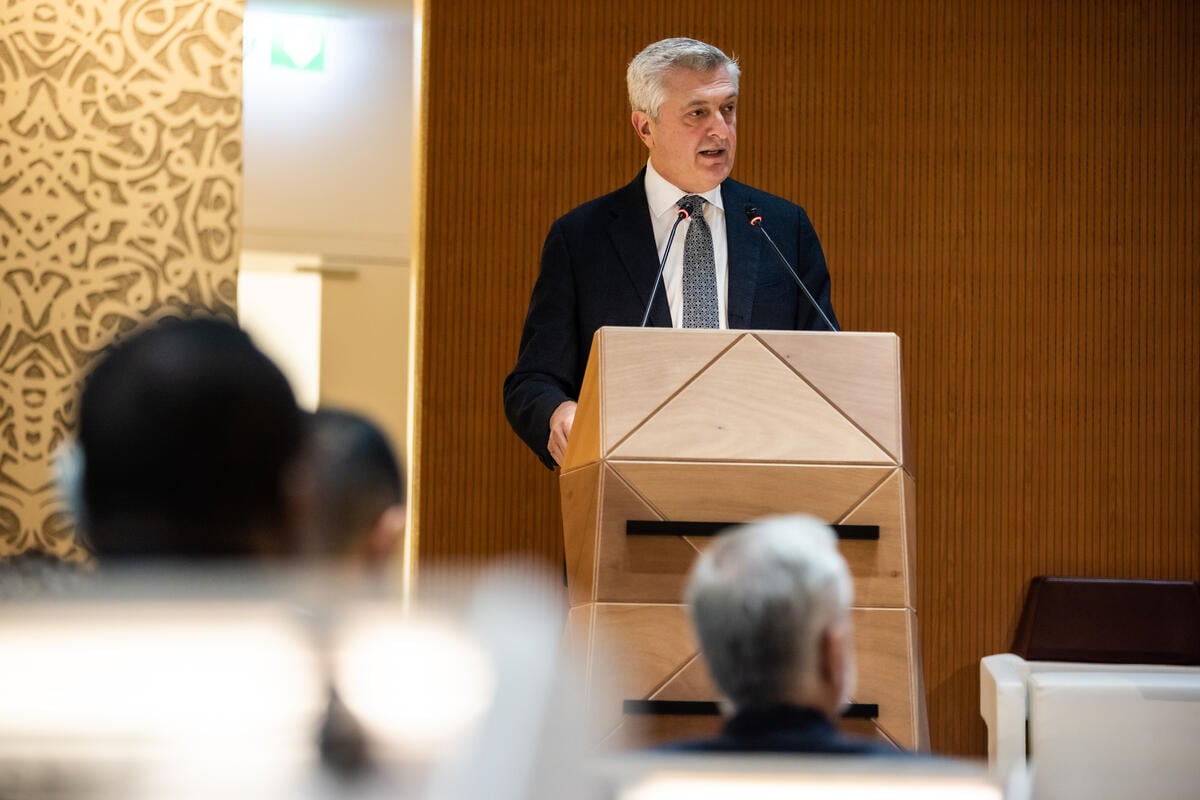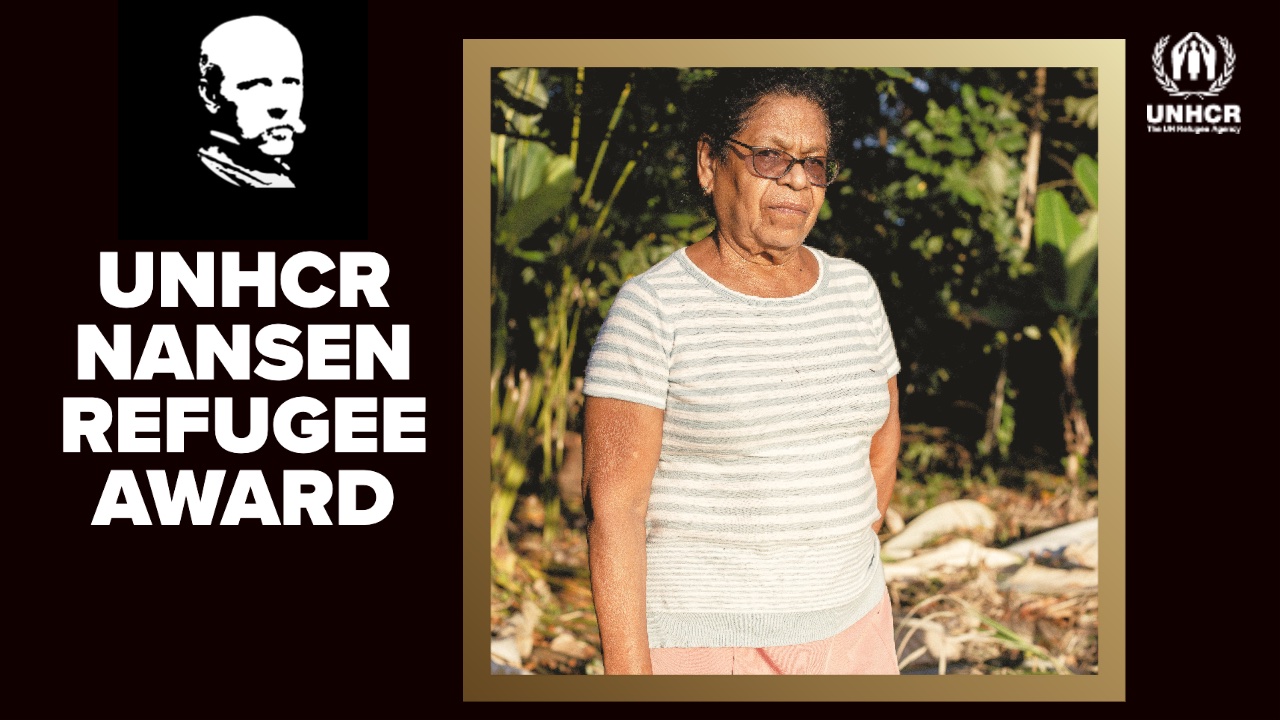Coronavirus pandemic wreaks havoc on displaced Venezuelans
Coronavirus pandemic wreaks havoc on displaced Venezuelans

2020 was looking to be a better year for María,* a Venezuelan grandmother who was making great strides toward rebuilding her life in neighbouring Colombia. Working as a street vendor, pounding the pavement of downtown Medellín with her snack cart from dusk till dawn, María managed to save enough to send for her son, his wife and the couple’s newborn twins. Plus, the whole family had just upgraded from a tiny rental room to a proper studio apartment.
Then came coronavirus and the lockdown that has prevented María from going out to work, stripping the family of their income and subjecting them to hunger and the looming spectre of eviction.
“At one point, we didn’t even have coffee to help us get through days in which we were eating only one meal,” said 55-year-old María, who moved into the new apartment on the very day that Medellín’s stay-at-home order was decreed. Stuck inside, the family had no idea how they were going make money to buy groceries, let alone pay the rent.
The family received emergency assistance from the Colombian government and UNHCR, the UN Refugee Agency, which allowed them to resume eating three meals a day. But María worries that the global pandemic could reverse all the progress they have made, leaving them even worse off in their new host country than they were back in Venezuela.
Stories like those of María and her family are tragically common among the more than five million Venezuelan refugees and migrants currently living outside their country, having fled widespread hunger, violence and insecurity back home.
“Without alternative income sources, these workers and their families will have no means to survive.”
The pandemic is, or course, taking a devastating economic toll on billions of people and countries the world over. In a recent statement, the International Labour Organization warned that “1.6 billion workers in the informal economy – that is nearly half of the global workforce – stand in immediate danger of having their livelihoods destroyed.”
“Without alternative income sources,” the UN agency warned, “these workers and their families will have no means to survive.”
The Geneva-based organization also noted that refugees and asylum-seekers – the vast majority of whom, like María, live in low- and middle-income countries – could become “double casualties,” at risk of infection and plunged into destitution by the contagion-prevention measures.
Many refugees and migrants just manage to scrape by, hand-to-mouth, in the best of times, with neither a safety net nor a social support network. Now, amid the pandemic that has stripped them of earnings to cover their basic needs, they are often at higher risk than the population at large of eviction, stigmatization, homelessness and malnutrition.

Anxiety about all of that is gnawing at Yésica,* a 33-year-old mother of three from Venezuela who sought safety in Ecuador in 2017.
Since she was let go from her job as a waitress at an upscale ceviche restaurant in the Ecuadorian capital, Quito, at the start of the pandemic, Yésica has also had a constant headache and upset stomach. While the symptoms sound alarmingly like those sometimes associated with COVID-19, her husband, who has not been called back to his job at a local hotel in over two months, assures Yésica her symptoms stem from the stress they are under.
When their landlord came knocking, they could only give him half the rent. And with the cupboards bare, the family has turned to handouts from a nearby convent to put food on the table.
“All I had to feed my children was rice with butter.”
“All I had to feed my children was rice with butter,” said Yésica, who worked as an operating room nurse back in Venezuela, before the family’s support for the opposition resulted in threats that forced them to flee.
The couple has toyed with the idea of trying to make a bit of cash for groceries by defying stay-at-home orders to sell face masks on the streets. But fear of how much worse their already difficult situation could become if they were to fall ill keeps them home.
In desperation, many Venezuelan refugees and migrants have already begun to return to the streets to sell or panhandle, their reluctant defiance of quarantine measures turning them into scapegoats and putting them at risk of detention. Others are resorting to survival sex, while others have opted to make the risky and arduous journey back to Venezuela.
Among those seriously considering returning is Aleydi Díaz, a 28-year-old Venezuelan living in Peru. Before the pandemic stuck, she sold bottled water and candies at a busy intersection in the capital, Lima. Her husband worked as a day labourer, some days in construction, others in a warehouse or as a janitor.
But now, they are stuck in the room they share with their three small children, with no savings and little prospect of making any money. And Aleydi knows that even if she did dare sneak out to hawk candies on the intersection, Lima’s streets are so bare she would be unlikely to sell much.
“In Peru, I had hopes of restarting my life and opening a small bakery,” she said. “Now, I’m desperate. I just want to scrape some money together so I can return to Venezuela because I fear for my children’s grandmother. I haven’t been able to send her money for three months and I worry she’s not eating.”
“We don’t have anything here or there, but at least there I would be with her,” said Aleydi.
UNHCR is working across Latin America and the globe to provide emergency assistance to refugees, asylum-seekers and internally displaced people hit by the pandemic, providing secure spaces in shelters and, in the most vulnerable cases, cash assistance to help people cover their basic needs so that they are not put in the position of having to choose between protecting their health – and their communities – and starving. The UN Refugee Agency is also joining forces with host governments to promote the inclusion of refugees and migrants in ongoing support programmes.
Timely and flexible support from governments, the private sector and individuals for ongoing humanitarian operations remains critical. The response plan for Venezuelan refugees and migrants is dangerously underfunded, with only 4 per cent of the requested funds received to date.
“For Venezuelan refugees and migrants, the pandemic exposes them to even greater hardship as many are now struggling to survive, away from home,” said Eduardo Stein, Joint UNHCR-IOM Special Representative for refugees and migrants from Venezuela, in an appeal for additional funding today.
“Venezuelans across the region are now faced with hunger, a lack of access to medical care, the prospects of homelessness and xenophobia,” he added.
Still, some refugees have managed to adapt amid the uncertainty. Consider Yilmary, a 37-year-old occupational therapist from Venezuela who reinvented herself as a street food vendor after arriving in the Brazilian megacity of São Paulo in 2016. Even with stay-at-home orders, she is succeeding in keeping her business afloat in Tentaciones da Venezuela.
By changing up her menu, pivoting toward internet-based advertising and using an online order and delivery service, Yilmary has kept serving up typical Venezuelan dishes.
“It’s not easy for anyone now, Brazilians or refugees,” she said. “But together, we can face this challenge.”
Reporting by Ángela Hurtado in Medellín, Colombia; Jaime Giménez in Quito, Ecuador; Danielle Álvarez in Lima, Peru; and Miguel Pachioni in São Paulo, Brazil. Writing by Jenny Barchfield.
*Names have been changed for protection reasons.









